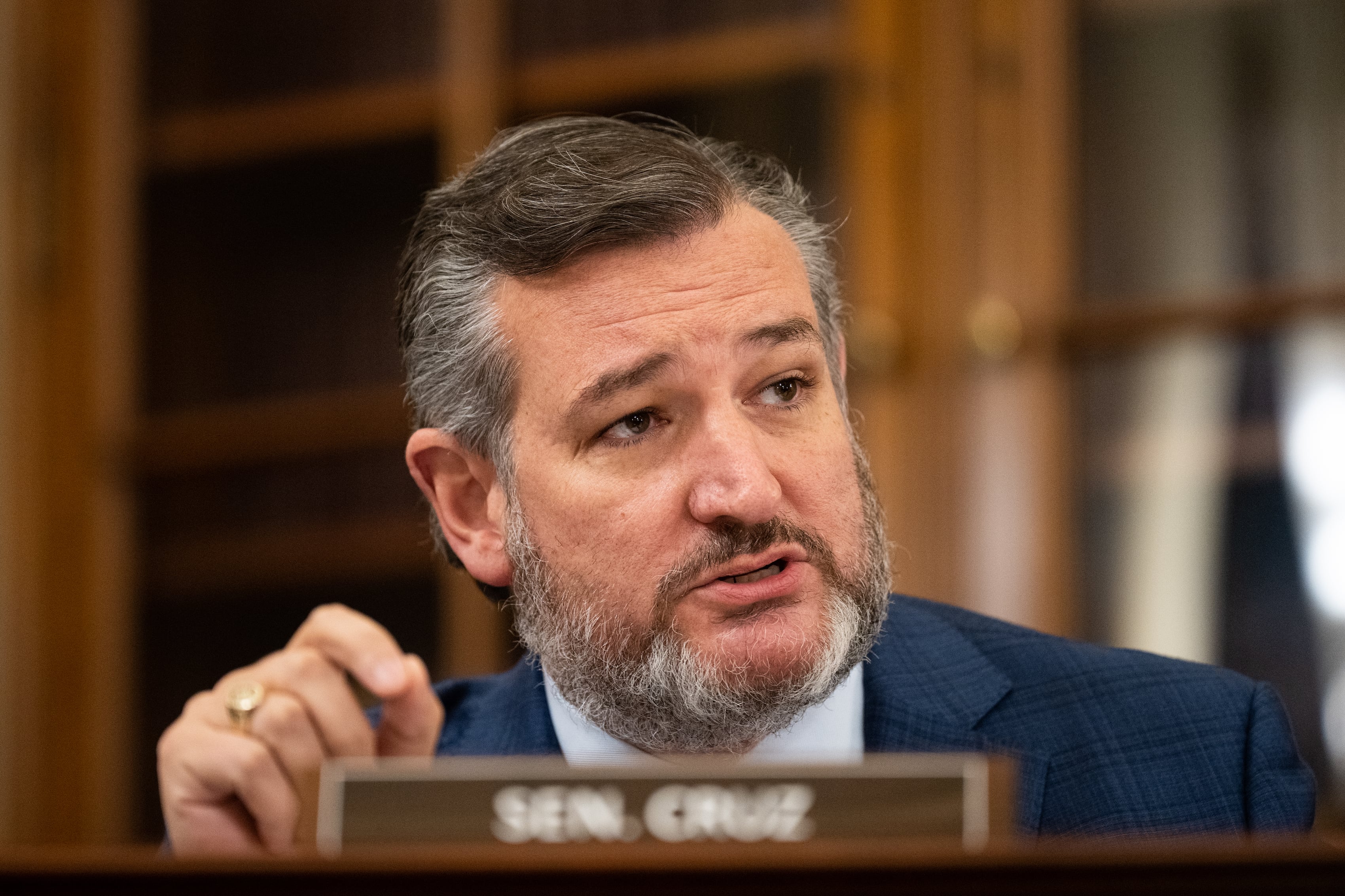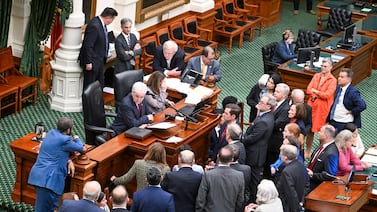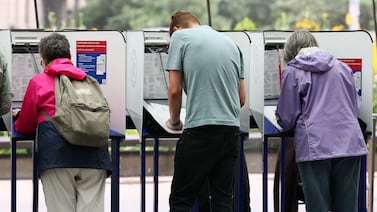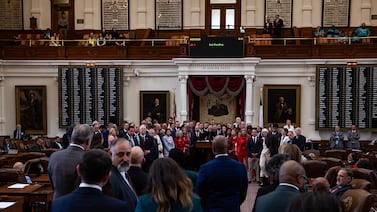A version of this post was originally distributed in Votebeat’s weekly newsletter. Sign up here.
As of Saturday, it has been 640 days since Jan. 6, 2021. And, finally, we have some movement on reforming the Electoral Count Act — that pesky law all those folks wielding flagpoles and assaulting police officers were told allowed Vice President Mike Pence to reject the will of the people. Of the 15 people on the Senate Rules Committee, which advanced legislation to update the act late last month, only one voted against doing so: Texas’s Ted Cruz.
“This bill is a bad bill. This bill is bad law. It’s bad policy and it’s bad for democracy,” Cruz said as he voted against it. He said the reform “reduces the ability of Congress to respond to the very serious problem of voter fraud.”
Cruz was one of the most vocal senators on the night of Jan. 6th. He stood to contest Arizona’s electoral votes, saying, “I urge you to pause and think, what does it say to the nearly half the country that believes this election was rigged if we vote not even to consider the claims of illegality and fraud in this election?”
It is troubling that a Harvard- and Princeton-educated U.S. senator claims to believe, despite all evidence to the contrary, that voter fraud is an overwhelmingly intractable problem. It is perhaps more troubling that he was motivated to yell “stop” during Congress’s certifying of electoral votes not because of any real evidence, but because lots of people simply felt like voter fraud was happening somewhere. He has been a central figure helping people get on that very bandwagon.
Like most Republicans in the immediate days after Jan. 6, Ted Cruz distanced himself from what he described as a “terrorist attack on the Capitol.” He called the violence “despicable” and said he disagreed with former President Donald Trump’s language. Since then, he’s done an about-face, spending a lot of time raising a lot of money from folks who do not believe Jan. 6 was a terrorist attack, but a justified fight for truth. His vote last week was the logical extension of what he’s said for months.
The bill advanced by the committee clarifies the vice president’s role in certifying Electoral College votes as ceremonial only. It also prevents the very stunt Cruz pulled on Jan. 6, raising the threshold of the required number of members who object to the counting of the vote to one-fifth of the members of each chamber — that’s up from the currently required one in each chamber. Had this reform been in place when he stood to object to Arizona’s votes, his objection would have been gaveled out immediately.
It probably stings Cruz to know that his party’s leaders have such an issue with his actions that they reformed a law written in 1887 to prevent him from doing it again. But sour grapes don’t play well on TV, so he came up with a bunch of unconvincing criticisms of the reforms. Among them: that the inability to reject a state’s electoral votes amounts to a “federal takeover” of elections; that Democrats have lodged illegitimate complaints about electoral votes before, too; and that the Hayes-Tilden dispute of 1876 provides a model for how to react to such issues without the need for reform. (That’s not new — he advocated such a model four days before Jan. 6.)
None of these reasons are valid, logically or factually.
First, it is not a “federal takeover” to prevent U.S. senators who represent other states from rejecting the will of the people. Second, the instances of Democrats objecting on specious grounds to the counting of Electoral College votes are additional points of justification for such reform.
And, y’all, the Hayes-Tilden dispute of 1876 was a total nightmare, and it blows my mind that anyone thinks it’s a model for anything.
A refresher: An ad-hoc committee appointed by Congress was tasked with resolving conflicting votes submitted in 1876. Even at the time, the commission was seen as a disaster. There is no basis in law or the Constitution for such a commission. Several members of the commission were offered bribes. And ultimately the presidency was awarded to Hayes on a party-line vote two days before inauguration.
That, reader, is chaos, and it nearly brought about a second civil war. It was this very dispute that brought about the Electoral Count Act, which passed 10 years later. While the statute was obviously shoddily constructed (thus justifying this attempt at reform), the passage of the act was clear contemporary acknowledgement that what happened in 1876 should never happen again.
Cruz’s nay vote on ECA reform was the only one on the committee, and the bill has advanced to the full Senate. All indications are that it will pass. But successfully reforming this act will not immediately erase the harms of the misinformation Cruz and similarly-minded lawmakers have spent so long spreading.
And Cruz, history suggests, is willing to act on that misinformation with unmatched intensity — a willingness his vote last week only bolsters. You’ll recall he offered to argue a case before the Supreme Court contesting the 2020 election, actively lobbied other representatives to join him in contesting the results, and has since continued to falsely insist that the 2020 election was rampant with fraud and technology problems.
He has intentionally made himself a star of this movement, and we shouldn’t expect the chaos he brings to stop even if this law passes — even if it takes some of the wind out of his sails.
Back Then
The Hayes-Tilden debacle doesn’t share much in common with our current troubles. Reading up on it is an interesting tutorial in how differently elections were conducted and finalized before more modern reforms. When the votes came in in 1876, it appeared New York Gov. Samuel J. Tilden had bested Ohio Gov. Rutherford B. Hayes. But, the results were unclear in Florida, Louisiana, and South Carolina, where both parties declared victory, and state officials sent conflicting returns to Congress. The Constitution offered no guidance for how to proceed with conflicting slates of electors, and so the House and Senate made something up: A one-time commission made up of legislators and Supreme Court justices would determine the fate of the election. Feuding ensued, and the commission was enveloped in controversy. A backroom deal ultimately allowed Hayes to take the election in exchange for an end to Reconstruction in the South. The full terms of the informal arrangement are unknown. Hayes was ultimately sworn in in a secret ceremony the day after the agreement was struck, as threats of his assassination loomed and congressional leaders felt it was the only way to ensure the peaceful transition of power. Power transitioned, but it came at great cost to Black Southerners, who no longer benefitted from federal oversight. Southern states began to pass Jim Crow laws, effectively reversing the significant suffrage gains of the previous two decades.
New From Votebeat
Inside a nearly empty federal courtroom Thursday, a fiery argument broke out between a judge and the lawyers representing Texas-based nonprofit True the Vote in a defamation and computer fraud case filed by a Michigan-based election software company. The contentious tone in the courtroom demonstrated the precarious position the lawsuit has put group in, as it tries to maintain its conspiratorial claims about the company, Konnech, while also denying accusations that it illegally hacked data or misled the public about the company and its CEO. Natalia Contreras reports from Houston on the hearing for Votebeat Texas.
If Michigan voters approve a set of voting reforms on the November ballot, they’ll get nine days of early in-person voting in future major elections. The local clerks who would be charged with providing the new option say it would make voting more convenient and elections smoother to conduct — but at a cost they don’t yet know and with no clear plans to pay for it, Oralandar Brand-Williams reports for Votebeat Michigan.
In Other Voting News
- A new Washington Post analysis of Republicans running for the U.S. House, U.S. Senate, and key statewide offices found 299 of them — a majority — have denied or questioned the results of the 2020 presidential election, and most of those candidates are running in safe Republican seats where they are likely to win.
- A federal judge found changes U.S. Postal Service Postmaster General Louis DeJoy made leading up to the 2020 election harmed mail delivery. The judge’s orders forbid DeJoy from banning postal workers from making late or extra delivery trips without permission, which he said had a major impact on service.
- A Waukesha County judge said Wisconsin voters cannot cancel their absentee ballots once submitted and cast a new one, ruling for a conservative group that brought a challenge to official state guidance permitting the practice, according to the Associated Press.
- Ohio Secretary of State Frank LaRose, who is running for re-election, is the latest of a growing number of Republican officials to propose hiring investigators dedicated to election fraud cases, which are rare. LaRose said he is planning to hire dedicated investigators next year to look into a range of potential cases, including threats, data breaches, and illegal voting, according to the Columbus Dispatch.
- A Michigan election clerk who was stripped of her authority over elections last year after promoting false election conspiracy theories and an alleged breach of security involving a vote tabulator also gave sensitive voter information to an outside expert under investigation in connection with other election security breaches in the state, Reuters reported. According to the news agency, the clerk, Stephanie Scott of Adams Township, could face criminal charges.
- A clerk in Kent County, Michigan, is asking a court to quash a subpoena from MyPillow CEO Mike Lindell demanding “forensic copies” of election data that includes security keys and passwords, among other things. The clerk, Lisa Posthumus Lyons, a Republican, said turning over the information would compromise election security and could force the county to replace the machines right before the November election.
- Nye County, Nevada, which plans to hand-count ballots in November’s election, is also planning to begin tallying mail-in ballots two weeks before Election Day, raising the risk of public release of early voting results, the Associated Press reports. The ACLU is suing the county, arguing their plan violates state and federal law.
Jessica Huseman is Votebeat’s editorial director and is based in Dallas. Contact Jessica at jhuseman@votebeat.org.






